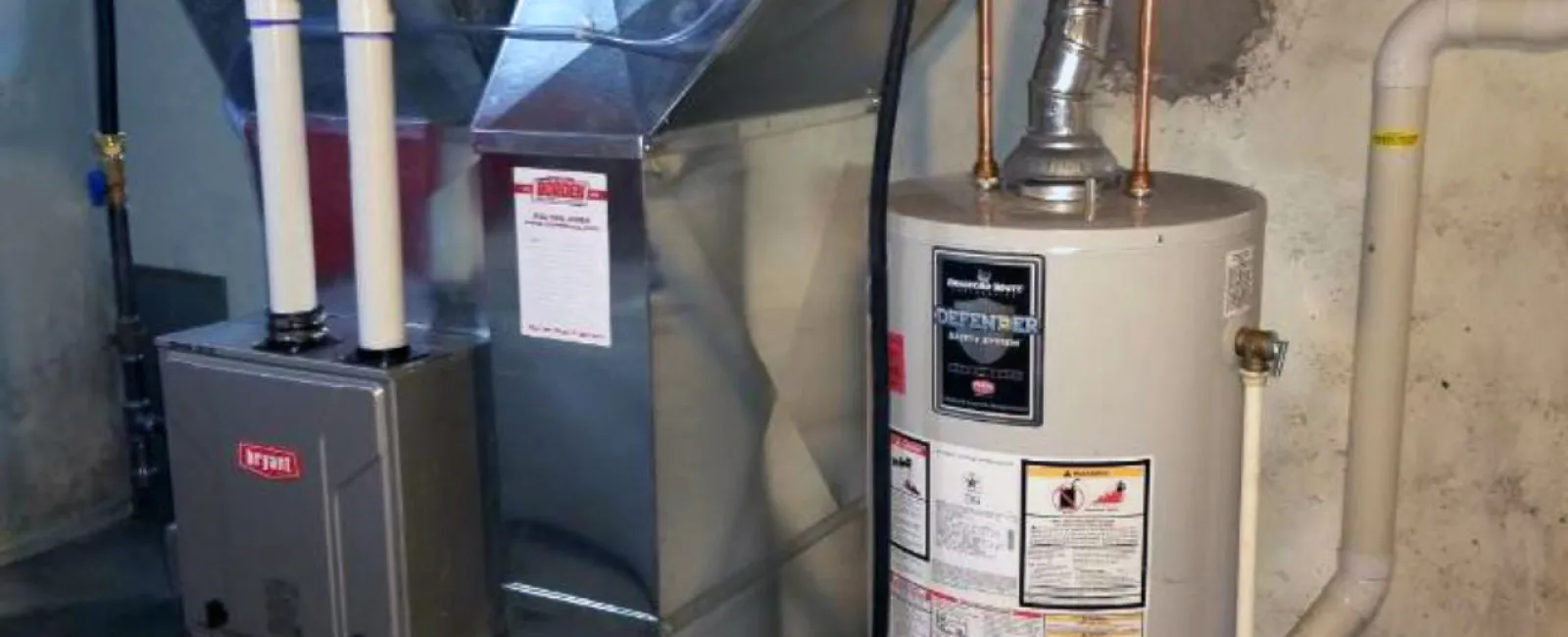November 11, 2024
What could be causing the loud noises from your furnace?
A loud furnace can indicate various issues, from loose components to airflow restrictions. Common furnace noises—such as buzzing, humming, or whistling—often signal underlying problems requiring immediate attention to prevent further damage and inefficiency.
Noises coming from your furnace are annoying and can signal inefficiencies that drive up energy costs or lead to system breakdowns. From routine maintenance to complete furnace replacement, it is essential to address issues promptly to maintain a comfortable and efficient home.
Common Furnace Noises and What They Mean
Every type of noise a furnace makes offers a clue about what might be wrong. Understanding these sounds can help you pinpoint the issue and decide whether it is a quick fix or a job for a furnace repair company.
Buzzing Noise
A furnace making a buzzing noise is a common complaint. This sound often
comes from electrical issues such as loose wiring, a failing transformer, or a
malfunctioning blower motor. Buzzing can worsen over time, so it is crucial to
address this issue promptly.
Humming Noise
If your furnace makes a humming noise, it is likely related to the
motor or capacitor. While a faint hum during operation is normal, a loud or
irregular hum indicates a deeper issue. Calling a furnace repair service can
help you avoid further damage.
Whistling Noise
Restricted airflow is the most common cause of a furnace whistling noise.
Dirty air filters, closed vents, or issues in the ductwork can lead to this
sound. Replacing the filter might resolve the issue, but persistent whistling
often requires professional intervention.
Banging or Popping
Loud banging or popping noises can occur for several reasons. Expanding
or contracting ductwork is a common culprit, but delayed ignition in the
burners is more severe and requires immediate attention from a local furnace
repair technician.
Squealing or Screeching
High-pitched squealing or screeching noises are typically caused by a
worn-out blower belt or failing motor bearings. Regular maintenance can often
prevent these issues, but professional repair is the best course of action once the noise starts.
Rattling
A furnace making weird noises like rattling often has loose panels,
screws, or internal components. This can happen due to normal wear and tear or
after prolonged use. Tightening loose parts may resolve the issue, but a
professional inspection ensures nothing is overlooked.
Thumping
Thumping noises often indicate an unbalanced blower wheel or motor. While this might seem minor, ignoring it can lead to more significant problems.
Persistent thumping might even indicate the need for a furnace replacement.
Chirping
A furnace making chirping sounds during startup is often testing its
components. However, if the sound does not stop, it may signal mechanical
issues that require a furnace repair service.
Hissing
A hissing noise is commonly associated with air leaks in the ductwork or
refrigerant leaks. Both issues can reduce efficiency and lead to uneven
heating. Calling a professional for home furnace repair ensures the problem is
resolved thoroughly.
How to Fix Pesty Furnace Noises
While some furnace noises can be resolved with simple DIY fixes, others
demand professional expertise. Here are some common fixes you can try before
calling a furnace repair company:
Clean or Replace Air Filters
Restricted airflow caused by dirty air filters is a common reason for
furnace noises. Replace your filter every 1-3 months to ensure smooth operation
and prevent whistling or buzzing sounds.
Tighten Loose Panels
If your furnace is making rattling noises, check for loose panels or
screws. Tighten them securely to reduce vibration and noise. Always ensure the
furnace is off before performing any maintenance.
Lubricate Moving Parts
Squealing or screeching noises often indicate dry motor bearings or
blower components. Lubricating these parts can reduce friction and noise, but
be cautious—this job might be better suited for a professional technician.
Inspect Blower Assembly
Thumping or banging noises can mean an unbalanced blower wheel. Inspect
the blower assembly for debris or damage, but if you're unsure how to fix it, call a local furnace repair service for assistance.
Address Electrical Issues
Buzzing or humming noises often stem from electrical problems, such as a
failing capacitor or transformer. Working with electricity can be dangerous, so it's wise to leave this task to a certified furnace repair company.
When to Call a Furnace Repair Company
Some furnace issues are too complex or dangerous to handle on your own.
Persistent noises, poor heating performance, or frequent cycling are signs that
it's time to search for "furnace repair near me" and schedule a
professional inspection.
Why Choose Professional Furnace Repair?
- Expert Diagnosis: Trained technicians can quickly
identify and resolve issues.
- Safety: Professionals know how to
handle electrical components and combustible systems safely.
- Longevity: Regular maintenance from a
furnace repair service ensures your system lasts longer and operates
efficiently.
Preventative Maintenance to Avoid Furnace Noises
The best way to prevent furnace noises is through regular maintenance.
Working with a reputable local furnace repair company ensures your system stays
in top shape. Here is what routine maintenance typically includes:
- Cleaning Components: Dust and debris in burners or
blower assemblies can lead to inefficiency and noise.
- Inspecting Ductwork: Checking for gaps or damage
prevents rattling and whistling.
- Testing Electrical Systems: Ensuring all wiring and
components function correctly reduces the risk of buzzing or
humming noises.
The Cost of Ignoring Furnace Noises
Ignoring a furnace making noise can lead to severe consequences. For
example:
- A buzzing noise might escalate to
a motor failure, requiring costly replacement.
- Delayed ignition causing banging
noises can result in damage to the heat exchanger.
- Ongoing airflow restrictions can
overwork your system, shortening its lifespan.
Addressing furnace issues early saves you money and ensures your home
remains comfortable throughout the winter.
When Is Furnace Replacement Necessary?
While repairs can extend the life of your furnace, there comes a point
when replacement is the more cost-effective option. Signs you might need a
furnace replacement include:
- Age: Most furnaces last 15-20 years.
If your furnace is nearing the end of its lifespan, frequent repairs may
no longer be worthwhile.
- High Repair Costs: If repair costs exceed half the
price of a new furnace, it's time to consider replacement.
- Inefficiency: Rising energy bills despite
regular maintenance suggest your furnace is no longer operating
efficiently.
Investing in a new furnace ensures reliable heating, lower energy costs,
and quieter operation.
Fix Your Furnace Noise Today
Don't let a noisy furnace disrupt your comfort. If you have recently
noticed unusual sounds coming from your system, contact MR. HVAC for immediate assistance. Whether it is a simple repair or a complete
furnace replacement, MR. HVAC delivers expert solutions tailored to your needs.
Our experienced technicians are committed to diagnosing and resolving furnace
issues quickly and efficiently, ensuring your home remains warm and comfortable
throughout the season.
Don't wait for the problem to worsen—reach out to MR. HVAC today for
reliable, professional service you can count on.




